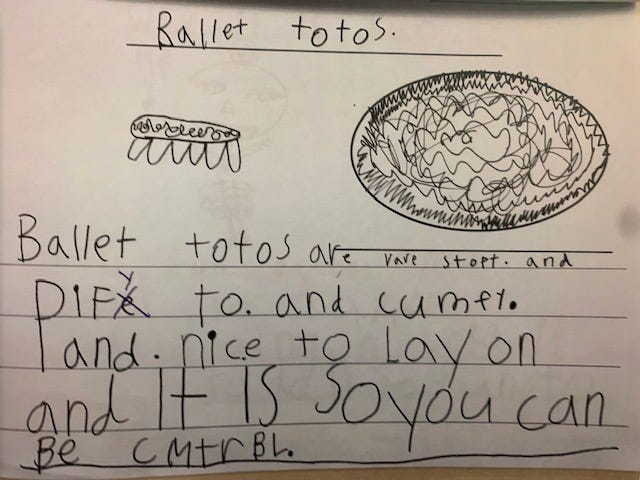Welcome to Raising Good Humans on Bulletin. We are so happy you're joining our judgment-free, science-backed parenting community. Subscribe now to get these articles in your inbox every week, AND consider becoming a premium member for exclusive behind-the-scenes access, LIVE Q&A's, and more original content.
For many of us, the switch to inventive spelling has thrown us for a major loop.
When was the last time you looked at your child’s writing and could actually tell what it said? Not only do we need our children to read their work to us (so that we can understand what it actually says), but we also worry that they will never learn to spell on their own.
Between inventive spelling and spell-check many parents find themselves on unfamiliar ground.
Most of us learned to spell by memorizing words in spelling class. Since then, research has revealed that spelling is a developmental process, and that inventive spelling plays a critical role in helping kids to learn. Inventive spelling allows children a greater understanding of the sounds of words, and the graphic representations that make up the English language.
What is Inventive Spelling?
Inventive spelling is when children take a “guess” on how to spell a word as they hear it in their heads. They call on their knowledge of letter sounds and spelling patterns to spell it as they hear it, thus “inventing” their version of how a word is spelled.
Why does this help?
Getting rid of the pressure to spell something accurately, and instead focusing on how it sounds to the child has some known benefits.
These include:
Allowing kids greater sophistication in word choice. This is because they can use vocabulary that they know, but would never be able to spell. Children try using bigger words because they no longer fear getting them wrong! If kids are worried about spelling something correctly, they tend to stick with words that are simpler to spell.
Reinforcing the connection between letters and sounds. Though the English language doesn’t always make sense, this type of spelling allows children to reinforce patterns in the use of letters to make certain sounds.
Creating greater opportunity to recognize patterns over time. As noted above, learning this way allows a child to practice patterns in sounds they hear and letters they use over and over. This helps them with spelling long-term.
Offering insight into areas where a child needs support. Inventive spelling can allow a teacher to focus on what a child does and does not know, helping them to learn what they need help with most and tailoring the learning to their own strengths and weaknesses.
How can I get my child to practice?
Find creative ways for them to write! This can include things like grocery lists, journals, or letters. Make sure your child has various writing instruments and materials to choose from - like pencils, crayons, smelly markers, construction paper, note cards, and sticky notes - and that they can easily access them in a safe and comfortable place.
What if my child notices their spelling is wrong, or asks constantly for words to be spelled for them?
Try not to give in to your child’s constant requests to spell words for them, or to proofread. Let them know that the most important part is getting the thoughts down on paper, and that only they need to be able to read it for now. If they are really determined, encourage them to use a dictionary to look up words themselves.
When do we correct mistakes?
For now, we don’t. If our children get too hung up on making mistakes, we run the risk of discouraging them from creative writing. However, you can hold your child accountable for thing you know they already know how to do - like keeping their letters clear, spelling words they already now, neater writing, etc.
How will they ever get better?
As kids advance in school, they’ll be taught spelling rules and encouraged to spell the words they know properly while they take risks with more advanced vocabulary. They will also be working to edit and revise their writing in multiple steps, and improving as they progress in the writing process.
I hope this helps,
Thanks for being a part of Raising Good Humans. We are in this together.





